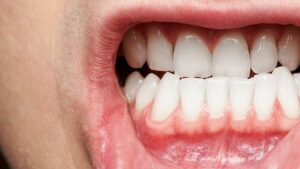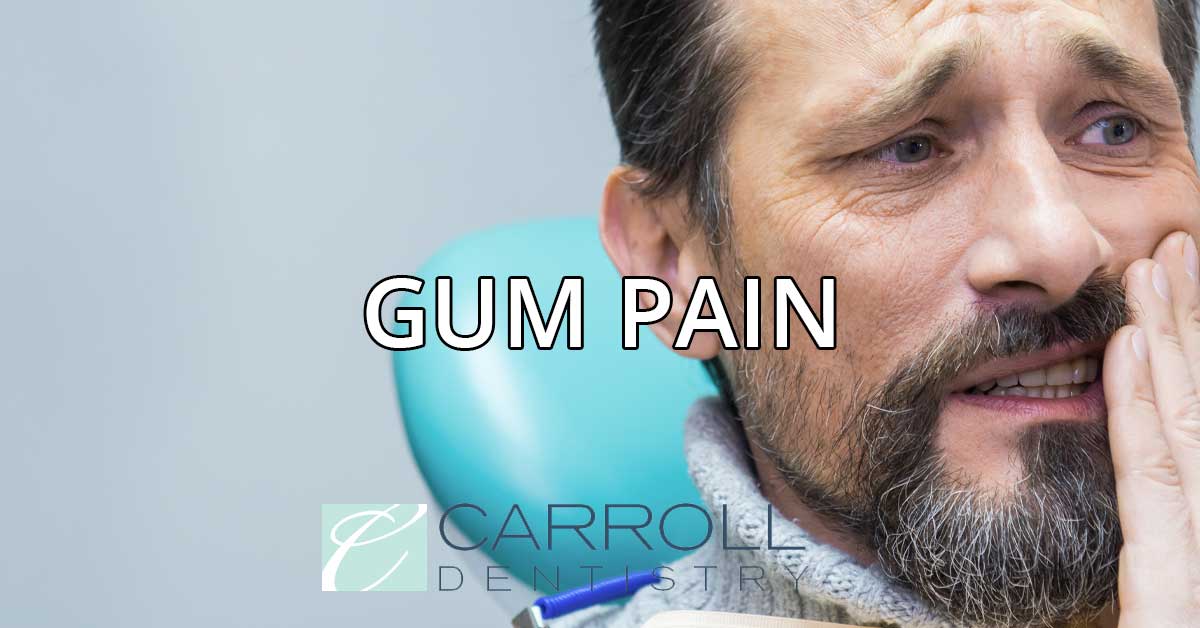If you experience painful gums when you eat, drink, brush, or floss, you may be wondering what’s causing it and how you can treat it. Painful or bleeding gums can be caused by improper brushing or flossing techniques, chemotherapy, tobacco use, or certain hormonal changes. It is very common for gum disease to lead to pain and bleeding, so resolving the problem is an important part of keeping your gums healthy. Your gums provide the overall support for your teeth and the basis of a healthy mouth, and if not properly cared for, early gum disease can progress to other serious oral health problems.

Gum disease is also caused by a build-up of plaque on the teeth. Plaque is a sticky substance that contains bacteria. Some bacteria in plaque are harmless, but some are harmful for the health of your gums. If you do not remove plaque from your teeth by brushing them, it builds up and irritates your gums. This can lead to redness with bleeding, swelling and soreness. Check HERE for more information about plaque.
Mild cases of gum disease can usually be treated by maintaining a good level of oral hygiene.
This includes brushing your teeth at least twice a day and flossing regularly.
You should also make sure you go for regular dental check-ups.
In most cases, your dentist or dental hygienist will be able to give your teeth a thorough clean and remove any hardened plaque (tartar).
They’ll also be able to show you how to clean your teeth effectively to help prevent plaque building up in the future.
If you have severe gum disease, you’ll usually need to have further medical and dental treatment.
In some cases, surgery may need to be carried out. This will usually be performed by a specialist in gum problems (periodontics).
Explore these home remedies for quick gum pain relief. Make sure to also learn the difference between when you can safely treat your gum pain at home and when you should see a dentist.
Saltwater rinse
Warm 1 cup of water on the stove (not to boiling — just warm) and pour into a cool glass. Add 1 tsp. salt to the warm water and mix well.
Swish the mixture in your mouth, and then spit it out into a sink when finished (don’t swallow).
The salt will help prevent the growth of bacteria in your mouth and decrease the bacteria on your gums, which may be causing the swelling.
Rinse your mouth with warm salt water at least twice a day until the swelling subsides.
Teabags
Take a fresh bag of tea and steep it in boiling water for up to 5 minutes, as you do to make tea. When the tea bag is cool enough to touch, apply it directly to painful gums for at least 5 minutes.
Improve your Nutrition
The best way to help with painful and inflamed gums is to prevent it in the first place.
A great way to prevent and improve your gums is to improve your nutrition. Start by incorporating calcium, vitamin C, and folic acid into your diet.
Not having these vitamins in your diet could be one of the culprits of swollen gums.
Vitamin C can be found in a variety of foods such as broccoli, bell peppers, oranges, pineapples, kale, kiwi, and strawberries.
Oral Anaesthetic Gels
You can also use oral anaesthetic gels you can get over the counter to help you with your gum pain.
These gels combine natural and synthetic ingredients to help numb your gums and bring you pain relief.
Oral gels usually use natural pain relievers such as clove or Spilanthes. Orajel and Anbesol, are common over the counter anaesthetic gels.
Hydrogen Peroxide
The hydrogen peroxide helps you soothe the pain and reduce gum inflammation. Hydrogen peroxide is a great agent to kills germs and fights many other oral problems.
To start, mix equal parts of water and hydrogen peroxide. Swish the peroxide solution in your mouth for about 20 seconds, spit on the sink, and rinse your mouth off with warm water.
Another way to use hydrogen peroxide is to make a paste using baking soda. Apply the paste to your mouth, wait a minute, and then rinse off.
When to see a doctor
Gum pain is often an isolated incident that can be easily treated or relieved.
In certain instances, gum pain can be a symptom of a bigger oral health issue. See your doctor or dentist if your gum pain:
- is persistent or intense
- interferes with eating or sleeping
- is accompanied by other symptoms
Make an appointment HERE.







